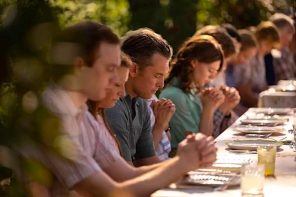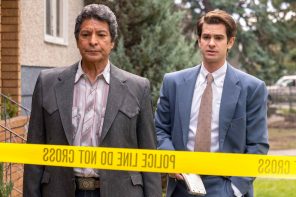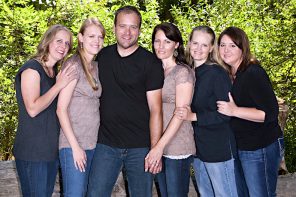Composer Nico Muhly’s Dark Sisters opened November 9 at the Gerald Lynch Theater in New York City. The opera focuses on the spiritual travails of a polygamous family in the American Southwest after their household has been raided by law enforcement. I spoke with Mr. Muhly last week to explore the production’s spiritual side.
Joanna Brooks: Tell me about the genesis of the project.
Nico Muhly: It began very abstractly. Basically, an opera commission comes up and it’s a big open question: what kind of stories make sense? I knew we would have space limitations because it’s a chamber opera. And with a chamber opera, it’s always best to have more women than men. So, I was thinking about dramatically intense situations with more women than men, and I thought about a polygamous home. And I had just finished an opera with a million children, and the [2005 raid on Warren Jeffs’ Texas Yearning for Zion ranch] had just happened. So we made a raid on a polygamous compound the the first act of the opera.
Were you watching coverage of the 2005 raid?
I was watching the coverage obsessively. I’d seen images from the 1950s [federal raid on the polygamous community at Short Creek, Utah], but it took a couple of days for the mainstream media to look up those images and for people to remember that this kind of thing had happened before.
What were your next steps?
Reading. There is a finite amount of reading you can do on fundamentalist LDS communities—a couple of hundred books and websites, and even local histories. So I started by reading. Then, I flew to Page, Arizona, and scooted over to Colorado City. That visit was really important. I grew up down a dirt road from the birthplace of Joseph Smith in Sharon, Vermont. What I’ve loved about LDS history is how site-specific it is: it treats America the way some people treat Israel. There is this procession of sacred sites still held sacred. Colorado City has that same heightened sense of place. I drove and walked around Colorado City and attempted to be as invisible as possible.
Ha!
It kind of worked. One thing that surprised me was this roadside espresso stand, with two women in prairie dresses operating a relatively sophisticated espresso machine and next to it a mortar and pestle with homemade herbal add-ons, like St. John’s Wort. I had a nice chat with women at the espresso stand. I talked with women in the dairy about Sharon, Vermont.
In representing polygamous Mormon women, what did you want to capture and convey?
The main thing we’re doing dramatically is that we trace one woman who starts to have feelings that she wants to leave. After all the kids are gone in the raid, she realizes she has to get her kids and get out. In talking with her sister wives, she expresses very small doubts, and the way they correct her, or agree with her, or displace the situation, is the exposition. One wife is into enduring earthly suffering for the celestial reward, a true believer—and we give her ravishingly ecstatic music that is in no way crazy. On the opposite end of the spectrum is the first wife, past childbearing age, who is hoarding objects and stealing prescription drugs. She tells the story of having two kids who drowned and being forbidden to mourn them. Then, there are two women who are the motor behind the household, and they have no time to think about bigger issues—it is all about practicality of physically making the household go.
In the second act, a television crew shows up, and wives are chosen to be the spokespeople. We recreate their television interview with Larry King. But we try to humanize it much more so that the audience can get this much more complicated human vista on the whole story of the FLDS from the beginning. We didn’t want to be judgmental; we didn’t want it to seem comedic. We wanted to emphasize the human aspect of the story.
What’s it like to stage this opera in the so-called “Mormon moment?” My gut sense is that the LDS Church’s aggressive visual rebranding “I’m a Mormon” ad campaign—big in New York City, I understand—is an effort in part to counter the riveting images of fundamentalist LDS people that have been in the news these past few years.
It’s so interesting because first of all, I am very clear with mainstream interviews that fundamentalist LDS is not the same thing as LDS.
It shocks me how prevalent the conflation of polygamous fundamentalist Mormons and mainstream Mormons still is.
Yes, and the way polygamy was banned by the mainstream LDS Church in connection with Utah statehood means, I think, that the question of polygamy will always track politically.
And polygamy as an eternal doctrine has not been negated among mainstream LDS people. It’s a very live idea still. Some orthodox Mormons expect to live it in heaven.
So much of all faith is not now but later. Mainstream Christians who think that polygamy is one of the most horrible things ever ignore Old Testament polygamy. It’s all so complicated. But he way in which it’s being legislatively controlled now is not sustainable. A bigger argument is going to come.
One hopes that an opera being an opera will allow for a more respectful conversation about these kinds of issues. Everyone treats these women like they’re brainwashed, but we were hyperaware not to be east coast gay guys making fun of them. For me, one of our cast members is very religious—Anglican—and she’s the one in the story who is the true believer, and gets this traditionally beautiful aria, and when she sings about how her mother and grandmother will be with her in heaven, and it helps us see her as a person with her own theological path through things. That’s a really important lesson to learn: to see everyone as a human being.




